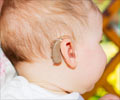People with central hearing loss were twice as likely to have mild cognitive impairment as people who had no hearing loss.

‘Central hearing loss may share the same progressive loss of functioning in brain cells that occurs in cognitive decline.’





The study looked at people with peripheral age-related hearing loss, which is caused by problems in how the inner ear and hearing nerves function and leads to people not being able to hear. It also looked at central age-related hearing loss, which is caused by problems in the brain's ability to process sound and leads people to say, "I can hear, but I can't understand." The study involved 1,604 participants of the Great Age Study, a population-based study conducted in the south of Italy, with an average age of 75, whose hearing and thinking and memory skills were tested. Of the participants, 26 percent had peripheral hearing loss and 12 percent had central hearing loss, 33 percent were diagnosed with mild cognitive impairment.
Researchers found that people with central hearing loss were twice as likely to have mild cognitive impairment as people who had no hearing loss. Of the 192 people with central hearing loss, 144 people, or 75 percent, had mild cognitive impairment. Of the 609 with no hearing loss, 365 people, or 60 percent, had mild cognitive impairment. In contrast, people with peripheral hearing loss were no more likely to have mild cognitive impairment than people with no hearing problems.
"These preliminary results suggest that central hearing loss may share the same progressive loss of functioning in brain cells that occurs in cognitive decline, rather than the sensory deprivation that happens with peripheral hearing loss," said study author Rodolfo Sardone AuD, EngD, MPh, at the National Institute of Health and University of Bari in Italy. "It's a problem with perception. Tests of hearing perception should be given to people who are older than 65 and also to people with cognitive impairment."
The researchers also found that people who had lower scores on a test that measured how well they understood speech also had lower scores on a test of thinking and memory skills.
Advertisement
Advertisement















